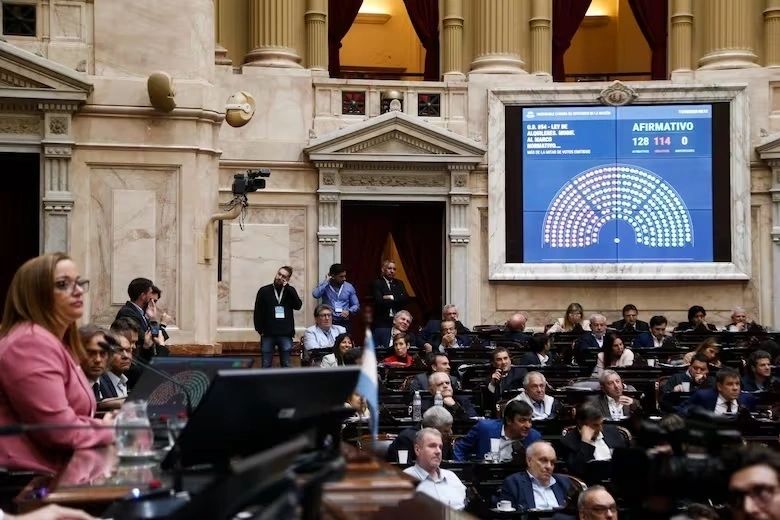BuySellBA
Administrator
The Government enacted the rental law: How the new contracts will be like and what taxes owners stop paying - La Nación Propiedades

Source:

 www.lanacion.com.ar
www.lanacion.com.ar
October 17, 2023
The contracts that are signed starting tomorrow will be governed by the conditions of the law approved last week in Congress

In the real estate sector, uncertainties regarding current contracts are causing concern among owners and tenants as they wait for the changes to come into effect.
The new rental law will come into effect starting tomorrow. That is to say, the contracts that are signed starting tomorrow, Wednesday the 18th, will be governed by the new rule. Today, Tuesday, the changes approved by Congress were published in the Official Gazette. The communication - which bears the signature of the head of the Upper House, Cristina Kirchner, and her counterpart in the Chamber of Deputies, Cecilia Moreau - establishes the variants introduced to law 27,551, voted last week in the Lower House.
The new rule proposes two key changes in relation to the contracts signed until today: now the rents will have an adjustment every six months - before it was once a year - and the percentage of this increase will be based on the Casa Propia coefficient. The duration will continue to be three years but the Central Bank's ICL and the annual adjustment no longer apply: the new index to be applied is based on the lowest indicator between the average salary variation of the last year and the average inflation during the same period.
Other changes introduced by the new standard:

The new rental law was approved in last week's session of Deputies
But Domínguez analyzed that it is not clear what the exemption from paying the monotax is, given the different situations that may arise. If the taxpayer only rents two properties and is within the income parameters of the monotax, that is, it does not exceed $7,996,484.12, it can be considered that the monotax fee should not be paid. “But if a taxpayer also carries out other activities, given that the monotax fee is unified, will it be determined that a part of the fee should not be paid? proportionally to income? We understand that the reform should have indicated that income coming exclusively from the leasing of up to two properties should not be considered income for the purposes of categorization instead of exempting from the monotax," analyzes the tax expert, who clarifies that we will have to wait until Learn about the regulations to see how this exemption is implemented.
“For example, tenants who do not own any property, whatever the proportion, can deduct 40% of the rentals of properties used for their home, and up to the limit of the non-taxable minimum applicable to each period,” explained the tributary.
It is important to mention that the law does not differentiate between lessors, which is why the 10% deduction may be computed by individuals, undivided estates and legal entities.
The Casa Propia coefficient calculates the average of the salary variation and the inflation variation, selecting the lowest value (which is usually the salary, due to the limited increase in income compared to the dizzying rise in prices). As a result, the increase in rents will be linked more to wages than to inflation. This means that homeowners will continue to face inflation gaps.
 Modificar imagen
Modificar imagen
Those who already have contracts signed and in force will not experience changes.
Those who have a contract in progress must be clear that the contracts until they end (three years in duration) will maintain the annual adjustment and based on the ICL, the points established by the law passed in July 2020. “The law does not have retroactive effect, unless expressly specified,” says Enrique Abatti, lawyer specializing in Real Estate Law and president of the Chamber of Property Owners of Argentina.
This is a process that is similar to what happened when the rental law currently in force was passed in July 2020: the contracts that were already in place maintained their conditions until their end. Once that contract is finished, the new one must be made under the new standard with the semiannual update and the adjustment according to the Casa Propia index. In both cases, the duration is three years because that point was not modified.
However, for those who wish to maintain the conditions of a current contract despite the enactment of a new law, there is the possibility of extending them, allowing the parties to extend the conditions of the agreement up to 20 years with extensions that can be quarterly, semiannual or annual. This is applicable as long as both the property and the parties involved remain unchanged. In the event of a change in tenant or ownership, a new contract will be required to be signed under the most recent legislation. This strategy has become popular among those who anticipate a change in legislation and wish to maintain more favorable conditions.
 Modificar imagen
Modificar imagen
Those who sign a contract starting today will do so based on the new rental law
The expectation of the sector's leaders who assure that this rule is even less beneficial than the one sanctioned in 2020, anticipate that people whose contracts are close to expiration will seek extension agreements of three, six or eight months, pending possible modifications. under a potential new government starting in December and new legislation.
It is relevant to highlight that two of the three main political forces competing in the next elections, specifically the deputies of Javier Milei (La Libertad Avanza) and Together for Change (whose presidential candidate is Patricia Bullrich), voted against the modifications to the law that came into force today. Reason why it is not ruled out that in the event that any of these political forces win the presidential elections, they will repeal the new norm.
www.buysellba.com

Source:
El Gobierno promulgó la ley de alquileres: cómo serán los nuevos contratos y qué impuestos dejan de pagar los propietarios
Los contratos que se firmen a partir de mañana serán regidos por las condiciones de la ley aprobada la semana pasada en el Congreso
October 17, 2023
The contracts that are signed starting tomorrow will be governed by the conditions of the law approved last week in Congress

In the real estate sector, uncertainties regarding current contracts are causing concern among owners and tenants as they wait for the changes to come into effect.
The new rental law will come into effect starting tomorrow. That is to say, the contracts that are signed starting tomorrow, Wednesday the 18th, will be governed by the new rule. Today, Tuesday, the changes approved by Congress were published in the Official Gazette. The communication - which bears the signature of the head of the Upper House, Cristina Kirchner, and her counterpart in the Chamber of Deputies, Cecilia Moreau - establishes the variants introduced to law 27,551, voted last week in the Lower House.
The new rule proposes two key changes in relation to the contracts signed until today: now the rents will have an adjustment every six months - before it was once a year - and the percentage of this increase will be based on the Casa Propia coefficient. The duration will continue to be three years but the Central Bank's ICL and the annual adjustment no longer apply: the new index to be applied is based on the lowest indicator between the average salary variation of the last year and the average inflation during the same period.
Other changes introduced by the new standard:
- The elimination of the possibility for owners to request payment of months in advance from the tenant.
- The requirement that rental advertisements be made in national currency (pesos).

The new rental law was approved in last week's session of Deputies
- There are also changes related to tax aspects: five benefits were created effective for fiscal years 2023 and following. “For the monotax there is no annual fiscal year or annual fiscal period and it could be interpreted that the modification is retroactive to January 1, 2023,” clarified tax expert Sebastián Domínguez and details the specific changes, point by point. “We will have to wait to know the regulations to see how the Executive Branch intends to interpret the validity,” he explained.
1) Monotax I
One of the requirements to be able to join the monotax is not to exceed three simultaneous activities or not to have more than three operating units. Each property is considered a different operating unit even when the property leasing activity is a single one. “As of the modification, as long as the real estate lease contracts are duly registered with the AFIP, they will be considered as a single operating unit regardless of the number of properties affected by that activity,” explained Domínguez.2) Monotax II
The law establishes that income coming exclusively from the rental of up to two properties will be exempt from paying the monotax .But Domínguez analyzed that it is not clear what the exemption from paying the monotax is, given the different situations that may arise. If the taxpayer only rents two properties and is within the income parameters of the monotax, that is, it does not exceed $7,996,484.12, it can be considered that the monotax fee should not be paid. “But if a taxpayer also carries out other activities, given that the monotax fee is unified, will it be determined that a part of the fee should not be paid? proportionally to income? We understand that the reform should have indicated that income coming exclusively from the leasing of up to two properties should not be considered income for the purposes of categorization instead of exempting from the monotax," analyzes the tax expert, who clarifies that we will have to wait until Learn about the regulations to see how this exemption is implemented.
3) Personal Property
Real estate intended for residential use, with duly registered contracts, is exempt from the Personal Property Tax when the value of each of them is equal to or less than the amount established in the second paragraph of article 24. “The Law It does not establish a limit on the number of properties for the exemption but rather limits it based on their valuation. For the 2022 fiscal period, the amount indicated was $56,410,705.41. This amount must be adjusted for the variation in the Consumer Price Index (CPI) prepared by the INDEC for October 2023 / October 2022," Domínguez explained and explained that "according to the estimates we made, said value would be above $142,000,000 by 2023″.4) Tax on debits and credits
Credits and debits in savings accounts or bank checking accounts used exclusively for the operations inherent to the activity of leasing real estate for residential use, whose contracts are duly registered, as established by the regulations, are exempt from tax. This exemption applies to all types of taxpayers, not only to humans. Domínguez shared an example: if a corporation allocates a checking account for the exclusive use of the activity of leasing properties for residential use and registers it in the AFIP register, it would enjoy the exemption. “We will have to analyze the cost/benefit of bank expenses for opening the account versus the tax exemption. On the other hand, it is important to mention that a human tenant who receives the rent through a transfer in a savings account, currently does not pay the debit and credit tax, which is why he does not receive any additional benefit,” he analyzed.5) Income Tax
It is allowed to deduct 10% of the total annual amount of property rentals for residential purposes, both for the landlord and the tenant. Both parties, tenant and lessor, may use this deduction in addition to other deductions that exist.“For example, tenants who do not own any property, whatever the proportion, can deduct 40% of the rentals of properties used for their home, and up to the limit of the non-taxable minimum applicable to each period,” explained the tributary.
It is important to mention that the law does not differentiate between lessors, which is why the 10% deduction may be computed by individuals, undivided estates and legal entities.
Repercussions
The bad news is that in the real estate sector they do not expect these modifications to impact the crisis that the rental market is going through, which threatens zero supply. Because? Because for the current context to change, it is key to generate an incentive that increases the supply of rental properties, an objective that, according to real estate brokers, will not happen.The Casa Propia coefficient calculates the average of the salary variation and the inflation variation, selecting the lowest value (which is usually the salary, due to the limited increase in income compared to the dizzying rise in prices). As a result, the increase in rents will be linked more to wages than to inflation. This means that homeowners will continue to face inflation gaps.
What will happen to current contracts?

Those who already have contracts signed and in force will not experience changes.
Those who have a contract in progress must be clear that the contracts until they end (three years in duration) will maintain the annual adjustment and based on the ICL, the points established by the law passed in July 2020. “The law does not have retroactive effect, unless expressly specified,” says Enrique Abatti, lawyer specializing in Real Estate Law and president of the Chamber of Property Owners of Argentina.
This is a process that is similar to what happened when the rental law currently in force was passed in July 2020: the contracts that were already in place maintained their conditions until their end. Once that contract is finished, the new one must be made under the new standard with the semiannual update and the adjustment according to the Casa Propia index. In both cases, the duration is three years because that point was not modified.
However, for those who wish to maintain the conditions of a current contract despite the enactment of a new law, there is the possibility of extending them, allowing the parties to extend the conditions of the agreement up to 20 years with extensions that can be quarterly, semiannual or annual. This is applicable as long as both the property and the parties involved remain unchanged. In the event of a change in tenant or ownership, a new contract will be required to be signed under the most recent legislation. This strategy has become popular among those who anticipate a change in legislation and wish to maintain more favorable conditions.

Those who sign a contract starting today will do so based on the new rental law
The expectation of the sector's leaders who assure that this rule is even less beneficial than the one sanctioned in 2020, anticipate that people whose contracts are close to expiration will seek extension agreements of three, six or eight months, pending possible modifications. under a potential new government starting in December and new legislation.
It is relevant to highlight that two of the three main political forces competing in the next elections, specifically the deputies of Javier Milei (La Libertad Avanza) and Together for Change (whose presidential candidate is Patricia Bullrich), voted against the modifications to the law that came into force today. Reason why it is not ruled out that in the event that any of these political forces win the presidential elections, they will repeal the new norm.
www.buysellba.com

